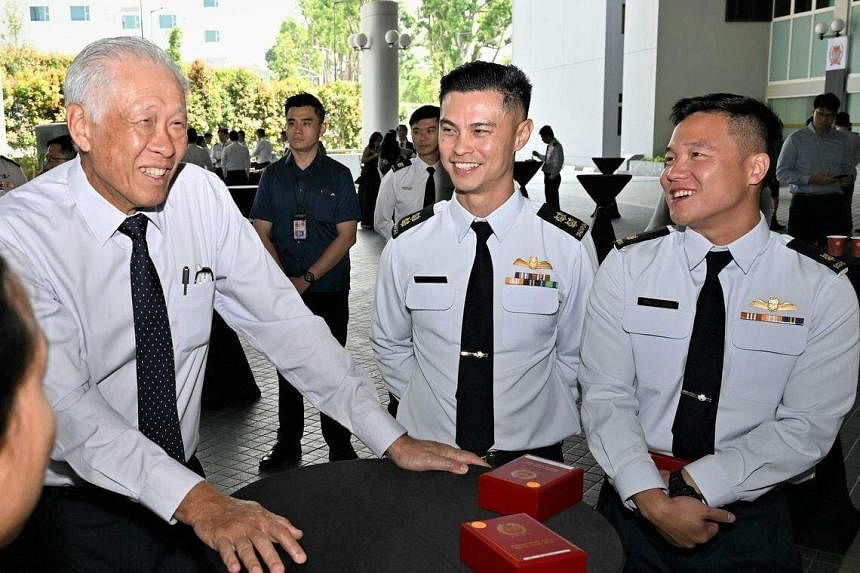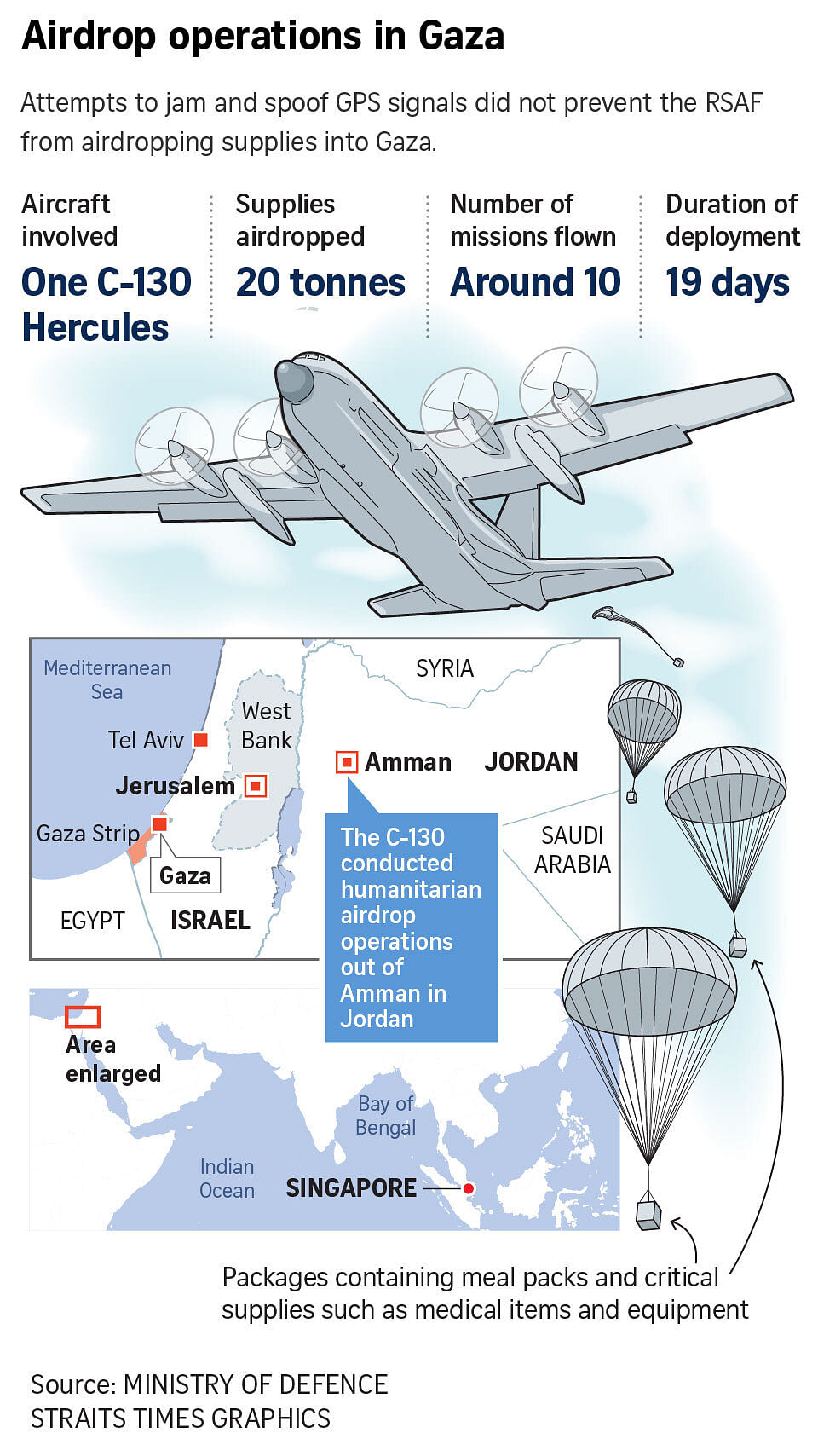RSAF aircrew recount challenges of Gaza humanitarian airdrops, including GPS jamming and harsh environment


SINGAPORE — Flying over Gaza in a C-130 transport plane, the Republic of Singapore Air Force (RSAF) crew were prepared when their Global Positioning Satellite (GPS) navigation system stopped working.
Having been forewarned by their Jordanian hosts about possible GPS jamming and spoofing in the conflict zone, the crew calmly let their peacetime training kick in, and carried on with their task of airdropping humanitarian supplies over Gaza, aided by other on-board navigation systems.
In total, the Singapore Armed Forces (SAF) mission crew successfully flew some 10 airdrop sorties during their two-week deployment in March 2024, and dropped about 20 tonnes worth of supplies – almost 60,000 meals – to civilians in Gaza, said the deployment contingent commander, Lieutenant-Colonel Darrell Goh, on June 25.
GPS interference was just one aspect of what made the SAF’s humanitarian deployment fraught with risks.
As the team flew their sorties from Jordan, part of the route put the C-130 aircraft within range of rockets from the Syrian border, revealed Defence Minister Ng Eng Hen.
"Things can go wrong but nothing, thankfully, and it turned out positive," Dr Ng said during a ceremony on June 25 to recognise SAF personnel for their contributions to overseas missions.
In total, 66 SAF personnel were awarded the Overseas Service Medal for their contributions to humanitarian assistance in Gaza, maritime security operations in the Red Sea, and counter-terrorism efforts in the Middle East.
The Gaza mission also had to contend with unpredictable weather. LTC Goh told The Straits Times that while in Amman, Jordan’s capital, there were several days when they could not fly due to rain and fog. One airdrop mission was cancelled due to bad weather.
ST Engineering programme manager Teo Eng Tze, who oversaw the defence firm’s support of RSAF’s C-130 fleet, said temperatures dipped as low as 8 deg C to 10 deg C during the deployment.
He said the windy and sandy environment meant measures had to be taken to keep the aircraft serviceable, including having additional checks and paying special attention to the use of blanks, or covers, to keep sand out of vulnerable areas of the aircraft, such as the engines.
Strong winds also meant the supplies had to be brought closer to the aircraft prior to loading to keep them from being blown over, something the crew had not experienced during training.
The success of SAF’s airdrop mission in Gaza, despite these challenges, has been noticed by Singapore’s neighbours, said Dr Ng, and some militaries nearby had asked for details so they could plan their own operations.
"Most militaries would understand that this was a complex operation, and the SAF was able to execute it smoothly as planned," he said. "This speaks volumes for our state of readiness and capabilities."
He added: "Through this mission, we demonstrated that the SAF can respond quickly and effectively to contingencies."

More importantly, the SAF’s ability to do so gives the organisation and Singaporeans confidence that the Republic can play a positive role in a troubled world – something that is much needed as the security environment will continue to be difficult, said Dr Ng.
Noting that the mission team had moved quickly and responded within six days of being activated, Dr Ng said: "I am proud that the SAF executed this mission successfully and in good time."
Mission personnel such as Captain Tan Hui Xin from the SAF 3rd Transport Battalion’s Air Terminal Company said their Jordanian hosts’ assistance was invaluable to the team meeting its mission goals.
"The Jordanians were very hospitable and forthcoming in facilitating area and resource management to ensure that the SAF was well-supported for the mission," said CPT Tan, who led the rigging team responsible for securing the loads to be airdropped by parachute.

LTC Goh also credited the Jordanians for helping to secure clearance for the multinational airdrop effort that also included aircraft from Egypt, France, Germany and the United Arab Emirates.
The Jordanians also offered the use of parachutes to airdrop Singapore’s supplies, though this was not tapped as the deployment had brought enough parachutes with them.
Both LTC Goh and CPT Tan said that regular airdrop training and integration efforts between the RSAF and Singapore Army – including at overseas exercises like Exercise Wallaby in Australia – ensured that the deployment would go smoothly, as the mission personnel all knew one another from having trained together.
"Being able to execute the mission smoothly also provided me with affirmation on the current peacetime training and systems that are in place to ensure that the SAF can respond to such mission demands readily," said CPT Tan.
ST Engineering’s Teo said he took pride in having been part of the mission. "To be able to be part of the operation to deliver humanitarian assistance to the people of Gaza is something that I am proud of," he said.
ALSO READ: 'A whole-of-society effort': 300 youths pack 5,000 care packages worth $100k for children in Gaza
This article was first published in The Straits Times. Permission required for reproduction.